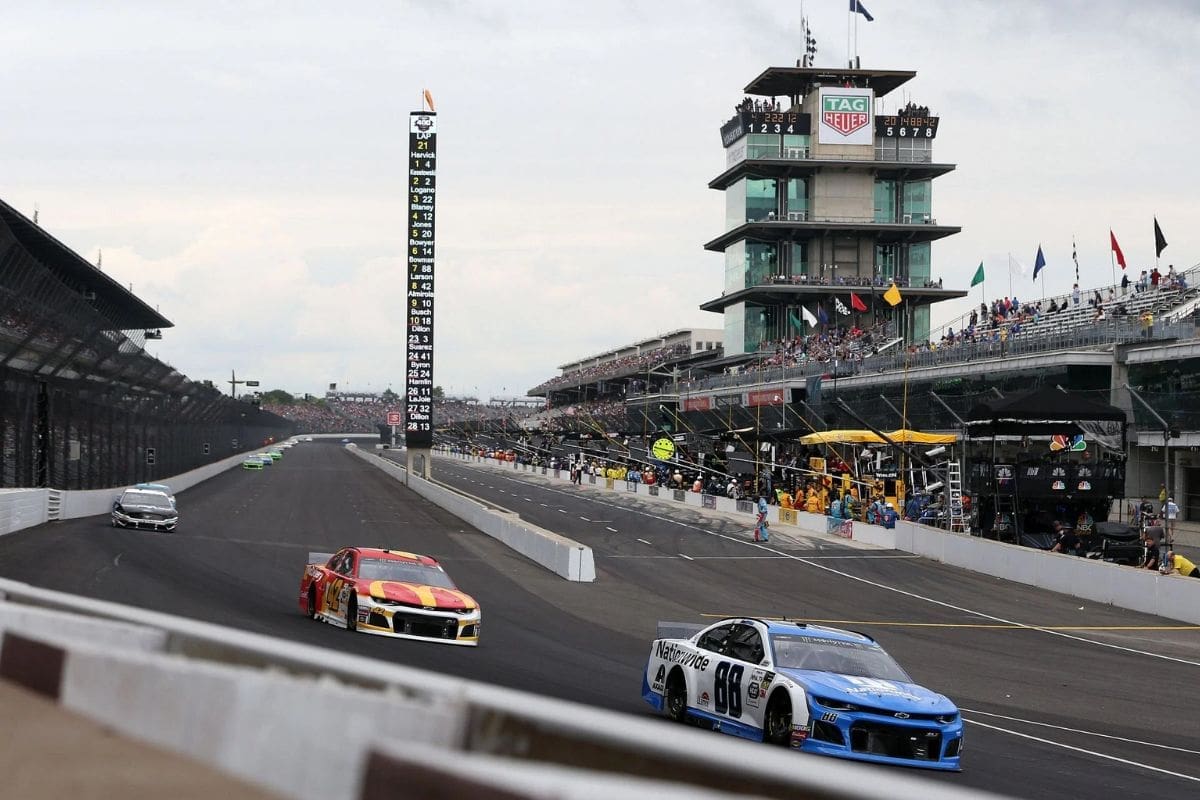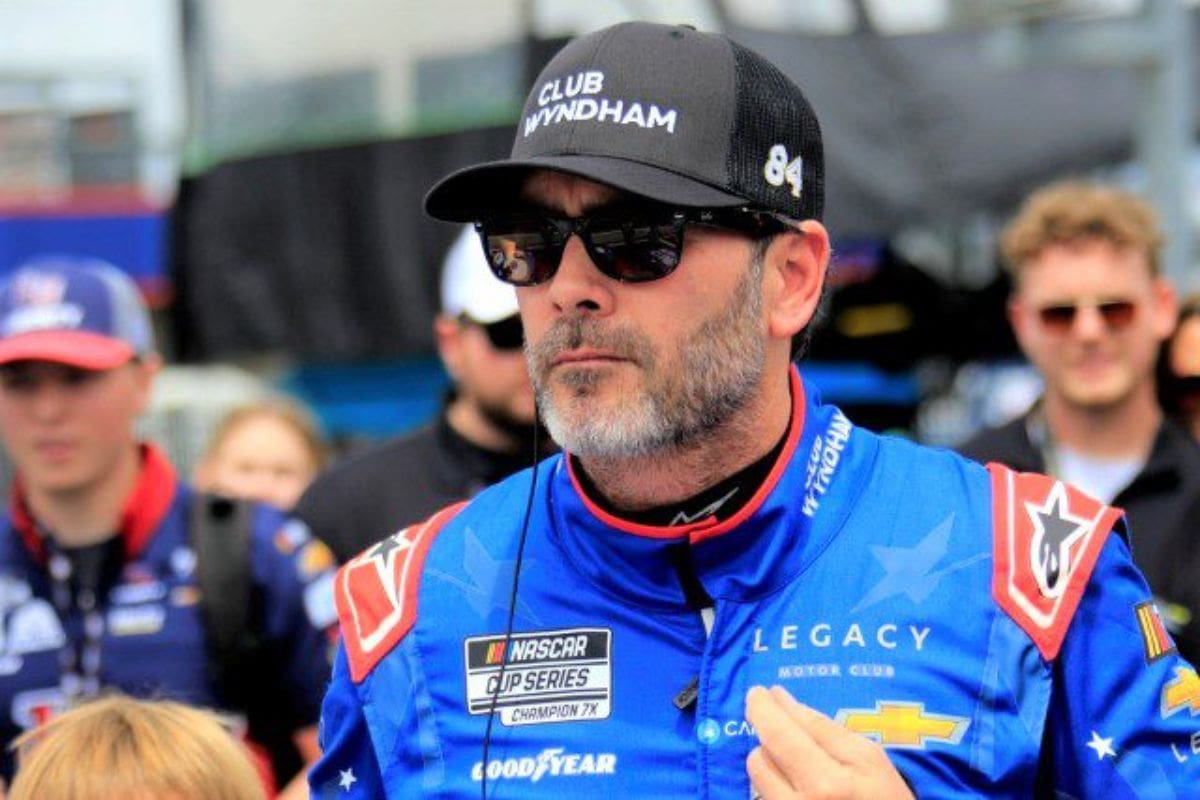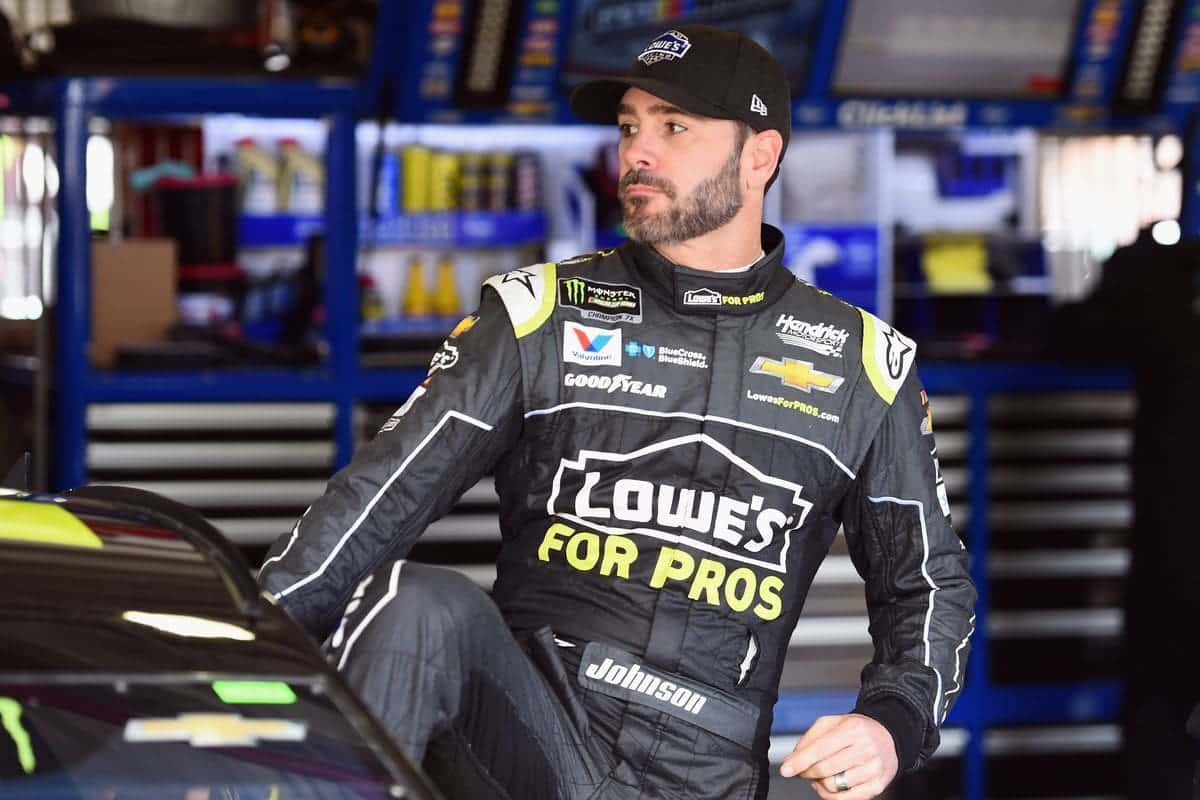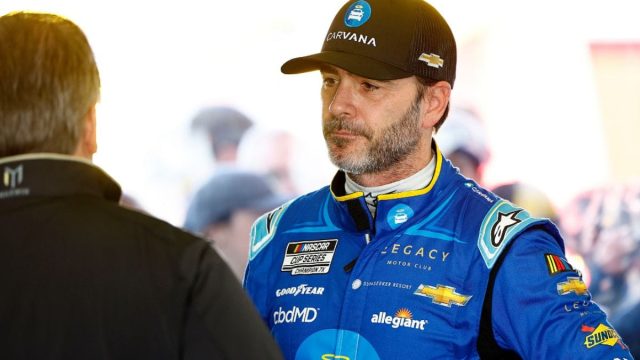Jimmie Johnson Faces Ownership Challenges: Jimmie Johnson‘s shift into co-ownership at Legacy Motor Club presents a complex interplay between leadership and performance, particularly as he grapples with recent crew chief changes. The departure of Jason Burdett highlights the stakes involved in achieving competitive results but also the inherent challenges of managing a racing team while maintaining his role as a part-time driver. This dual responsibility raises critical questions about strategy, team cohesion, and the implications of ownership decisions in a high-pressure environment. What strategies will Johnson employ moving forward to navigate these turbulent waters?
Key Highlights
- Jimmie Johnson’s role as co-owner and part-time driver complicates decision-making during crew chief transitions.
- The recent release of crew chief Jason Burdett underscores the urgency for improved performance results.
- Limited competitive finishes highlight the challenges of aligning team strategy and racing dynamics.
- Leadership issues during crew chief changes necessitate strong management skills to navigate team complexities.
Jimmie Johnson Faces Challenges as Co-Owner of Legacy Motor Club
Jimmie Johnson’s dual role as a co-owner and part-time driver for Legacy Motor Club highlights the intricate challenges of balancing competitive aspirations with the operational demands of a racing team. As a seven-time Cup Series Champion, Johnson possesses an unparalleled wealth of experience in the sport; however, shifting from a driver to an ownership role necessitates a change in focus that is fraught with complexities.
The recent announcement of the release of crew chief Jason Burdett following a disappointing performance at the Indianapolis Oval emphasizes the volatility inherent in team management. Johnson’s leadership must navigate not only the technical aspects of vehicle performance but also the psychological dynamics of team morale and cohesion. The dismissal of a crew chief can have cascading effects, influencing both the drivers’ confidence and the crew’s operational synergy.
Moreover, Johnson’s part-time driving status complicates his dual responsibilities. Balancing the demands of on-track performance with tactical decision-making off the track requires an acute awareness of both immediate results and long-term objectives. The pressure to maintain competitive viability while fostering a nurturing environment for emerging talent is vital for the team’s evolution.
As Legacy Motor Club seeks to solidify its position in the NASCAR landscape, Johnson’s unique insights as a driver must be harmonized with his vision as an owner. This delicate interplay is essential for establishing a framework that not only honors the legacy of success associated with his name but also propels the team toward future achievements.
Johnson’s Recent Performance and Crew Chief Changes
Recent performances have highlighted the challenges faced by Johnson as he navigates the dual roles of a co-owner and part-time driver, particularly following the release of crew chief Jason Burdett after a series of disappointing results.
Johnson’s tenure as a driver in the NASCAR circuit has been marked by unparalleled success, yet his recent campaign in the 84 Toyota has been less than stellar. Competing in only nine races this season, Johnson and Burdett managed a best finish of 28th place across six races, a statistic that sharply contrasts with the high expectations typically associated with his name.
The decision to part ways with Burdett following the race at Indianapolis Motor Speedway (IMS) emphasizes the urgency for improved performance. Johnson’s ability to adapt to the intricacies of being a co-owner while simultaneously competing is now under examination, as on-track incidents and tactical misalignments have hindered his performance.

The challenges of balancing these roles may have contributed to the team’s struggles, further complicating Johnson’s efforts to reclaim a position of competitiveness.
As Johnson reflects on this shifting phase, it becomes clear that the intersection of leadership and performance in the high-stakes world of NASCAR demands a heightened level of synergy. The dynamics within the Legacy Motor Club will need to evolve, as both Johnson and the team seek to cultivate a more effective partnership moving forward.
Johnson’s Reflections on Co-Ownership
Steering through the complexities of co-ownership has prompted Johnson to reassess his approach and expectations within the sport, acknowledging the unexpected difficulties that accompany his dual role. The shift from a celebrated driver to a team owner has revealed challenges he had not anticipated. “I didn’t think it would be this tough,” Johnson remarked, reflecting on the steep learning curve that comes with managing both competitive aspirations and operational realities.
“I didn’t think it would be this tough, It’s a tough sport, and we have a great vision and have made a massive commitment to that long-term vision, so we’re on the journey.” – Johnson
His candid acknowledgment of the team’s struggles demonstrates a keen awareness of the nuances involved in ownership. Johnson’s expedition has been marked by a commitment to a long-term vision, yet the path has proven more arduous than initially expected. He noted, “I thought last year we were kinda at the bottom and then we went down a little lower,” indicating that the road to success is often fraught with setbacks.
Moreover, Johnson’s ambition to incorporate an additional car into his team’s lineup demonstrates a tactical mindset aimed at fostering new talent and groundbreaking setups. However, he remains acutely aware of the potential ramifications this could have on the performance of the existing cars. “I want to race, but I don’t want the third car to be a detriment to the other two,” he stated, emphasizing the delicate balance between expansion and performance.
“But I thought last year, we were kinda at the bottom — and then we went down a little lower and found a lower bottom. I do think we’re climbing our way out now, but there’s just so much that goes into it, and we’re getting the pieces in place and moving it along[…]I want to race, but I don’t want the third car to be a detriment to the other two. The revenue we generate can help us use the third car to develop new talent and can help us develop new setup ideas.” -Johnson
In steering through these challenges, Johnson’s reflections on co-ownership reveal a deeper understanding of the sport’s intricacies, underscoring his determination to enhance both his team and the broader racing community.

Legacy Motor Club’s Current Season
Despite the promising potential of Legacy Motor Club, the current season has been marked by challenges, as both Erik Jones and John Hunter Nemechek struggle to secure top-five finishes amidst a highly competitive landscape. The team, co-owned by Jimmie Johnson and Maury Gallagher, has found itself maneuvering the complexities of modern NASCAR racing, where performance is dictated not only by driver skill but also by the intricate interplay of technology, tactics, and team dynamics.
Erik Jones, with his experience, and John Hunter Nemechek, a rising talent, have yet to utilize their capabilities to consistently compete at the forefront. Several factors contribute to their underwhelming results, including difficulties in car setup, tire management challenges, and the relentless pressure of competing against well-established teams. This season’s heightened competitiveness has left little room for error, emphasizing the importance of precision in both driving and team operations.
Moreover, the evolving nature of NASCAR, with its focus on data analytics and performance optimization, places extra pressure on the Legacy Motor Club. As a team still establishing its identity post-rebranding from Petty GMS Motorsports, the ability to adapt quickly to changing circumstances is paramount.
Johnson’s IndyCar Career Reflections
As Jimmie Johnson reflects on his diverse racing expedition, his experiences in IndyCar serve as a demonstration of his adaptability and the lessons learned from competing in a different arena of motorsports. Shifting from a dominant NASCAR career to the IndyCar Series, Johnson initiated a part-time adventure with Chip Ganassi Racing, competing in 29 races during the 2021 and 2022 seasons. His best finish—a commendable fifth place at the Hy-Vee Salute to Farmers 300—highlights his competitive spirit and desire to succeed despite the challenges of a new racing environment.
“I really do miss it, I feel like I should’ve made the switch a few years earlier. I always have believed that you need five years – five years is the sweet spot before you really understand a given vehicle.” – Johnson
Johnson’s retrospective acknowledgment of his regret in not moving to IndyCar sooner than 2020 emphasizes a critical insight: the importance of time in mastering a new discipline. He stresses that five years is the ideal period for a driver to fully understand and excel in a new vehicle. This perspective not only reflects his analytical mindset but also his commitment to continuous improvement, a hallmark of his storied career.
Moreover, Johnson’s venture into IndyCar illustrates the broader theme of adaptability in sports; the ability to pivot and accept new challenges is crucial for sustained success. As he moves into ownership with Legacy Motor Club, these reflections on his IndyCar experience will certainly inform his approach, allowing him to utilize the lessons learned as he navigates the complexities of team leadership and development.

News in Brief: Jimmie Johnson Faces Ownership Challenges
The challenges faced by Jimmie Johnson as co-owner of Legacy Motor Club highlight the intricate balance between management and performance in NASCAR.
The recent crew chief changes, particularly the departure of Jason Burdett, reflect an urgent need for tactical adjustments to improve the team’s competitiveness.
As the season progresses, the capacity to effectively navigate these ownership complexities will be essential in determining the future path of both Johnson’s driving career and the general success of Legacy Motor Club.
ALSO READ: Dale Earnhardt Jr. Slams NASCAR Drivers for Premature Belt Undoing
